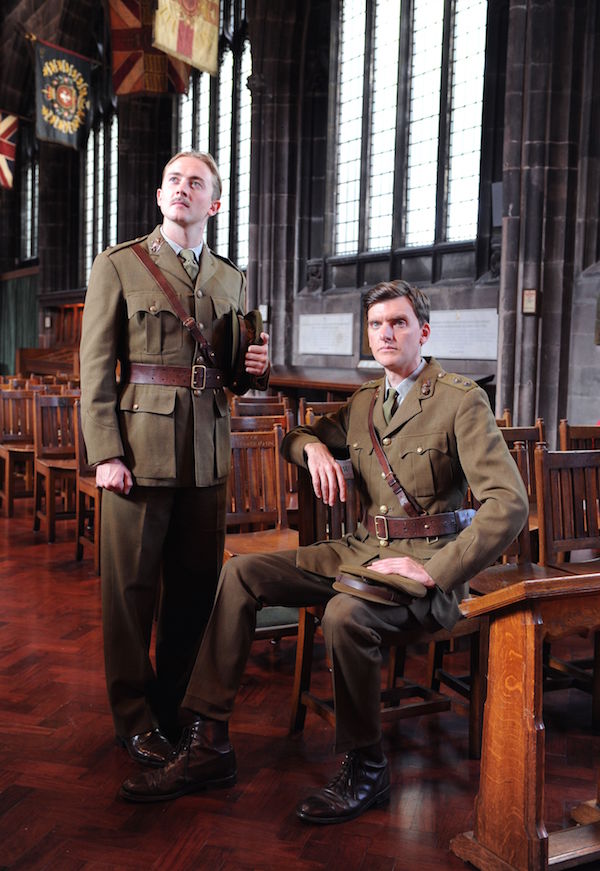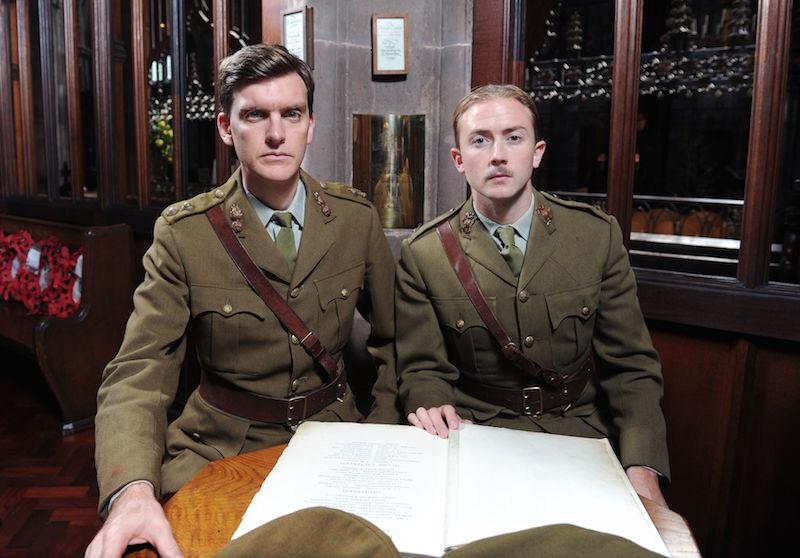This time of remembrance has inspired a fascinating theatrical skirmish. In one corner, Nicholas Wright’s 2014 Regeneration, an adaptation of Pat Barker’s trilogy; in the other, Stephen MacDonald’s 1982 two-hander Not About Heroes. Both plays, currently touring, concern the pivotal meeting of Wilfred Owen and Siegfried Sassoon at Edinburgh’s Craiglockhart War Hospital in 1917, but while the former examines shell shock and its treatment in compelling detail, the latter is content to place the poets and their enduring creations centre stage.
Sassoon (Alastair Craig, pictured below with Simon Jenkins) landed in what he termed “Dottyville” following his controversial letter to The Times denouncing the war’s prolongation, while Owen (Jenkins) was hospitalised after suffering a breakdown – what we would now recognise as PTSD. While incarcerated, Owen approached his idol and, under Sassoon’s tutelage, developed great work like “Anthem for Doomed Youth”. Tragically, he never lived to see the publishing of his first collection (the preface of which provides the play’s title), killed in France a week before Armistice.
 In contrast to that title, MacDonald’s attitude to his subjects verges on worshipful, offering a devotee’s collage of letters, verses and respectfully imagined encounters. The structure is far from sophisticated: many of the monologues and epistles unnecessarily underline reported or dramatised events, and there’s added repetition through somewhat inelegant flashback, heavily laden with irony and foreboding. It’s not so much revelatory drama as a safe frame for the searing poetry.
In contrast to that title, MacDonald’s attitude to his subjects verges on worshipful, offering a devotee’s collage of letters, verses and respectfully imagined encounters. The structure is far from sophisticated: many of the monologues and epistles unnecessarily underline reported or dramatised events, and there’s added repetition through somewhat inelegant flashback, heavily laden with irony and foreboding. It’s not so much revelatory drama as a safe frame for the searing poetry.
Where Caroline Clegg’s production succeeds is in evoking the connection between the two men, with a strict mentor/pupil dynamic blossoming into real kinship. They’re a wonderfully odd couple: aristocratic Sassoon alternating jaded elegance and furious sarcasm, while Owen, the timid, provincial son of a Shropshire railway clerk, reveals an uncanny ability to voice passionate truth. Jenkins’s lilting delivery hints at Owen’s Welsh heritage, while Craig captures Sassoon’s embodiment of and rebellion against the establishment.
Yet with the pair in total agreement about the war’s fallacies of honour and heroism, the play lacks a counter-argument – it’s two hours of unimpeded preaching to the choir. One of the few sources of conflict is whether you need to earn the right to judge something by experiencing it, with Owen feeling unable to criticise freely until he’s proved himself at the Front. Decorated Sassoon, in contrast, threw away his medals when he recognised that his courage was actually recklessness born of survivor’s guilt. Wright arguably provides more nuanced exploration of such issues, but there is quiet devastation here through the recollection of past horror and the bond it creates with a fellow sufferer.
Ailís Ní Ríain’s memorable cello music supports the lyrical script with its subtly portentous strains. Yet it’s the verse that lingers, from the stark words emblazoned on the back wall of Lara Booth’s set to the mellifluously recited poetry, still shockingly incisive. If the drama fails to match that creative audacity, it does at least offer a timely reminder of it.















Add comment